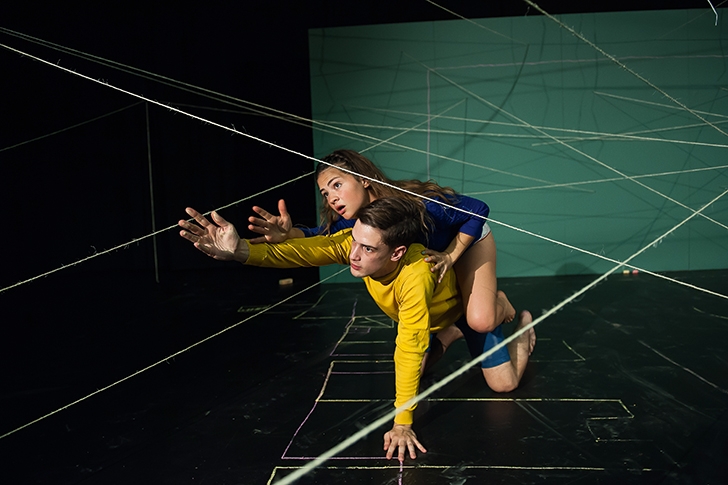David Spicer’s farce Raising Martha opens with a skeleton being disinterred on a frog farm by animal-rights activists. They hope to force the frog farmer, an ageing dope fiend, to set his amphibious livestock free. Got all that? It’s complicated. And there’s more. The skeleton turns out to be the long-dead mother of the farmer, who alerts his shifty brother and calls in the cops as well. A loquacious twerp, Inspector Clout, arrives to investigate and the tangled narrative starts to unfold.
This is an uneven play but the good bits are excellent. Stephen Boxer is amusingly deranged as the hallucinating frog man. The animal-rights activists are wittily portrayed as misanthropic nuisances. Clout, the cop who can’t stop nattering, is the least original and least successful character. He sounds like a dated platitude (calling everyone ‘sir’) and his visual stylings belong to the 1950s: trench coat, trilby, moustache. Spicer likes to tinker with the mechanics of his storyline, which causes needless duplications. Does the farmer cultivate frogs or marijuana? Both. Are the militant veggies plotting against the farmer or against each other? Again, both. The whereabouts of mum’s skeleton becomes a little tiresome to follow and the imaginary six-foot amphibians stalking the farmer are less hilarious than they might be.
Clarifying these bumps and wrinkles would make the show cleaner and its flight smoother. And though Spicer is full of mirth, and he’s gloriously alive to the absurdities of language, he’s missing a quality regarded by some as crucial. He’s not angry. A great farce usually has an element of moral retribution with an overmighty wrongdoer being forced to endure exposure and humiliation. (This, incidentally, is why Trump is immune to satire: his private solecisms are already public knowledge.) But Spicer has no desire to challenge grandees and the interests they control. Instead he chooses offbeat and perhaps rather flimsy targets: stoned bumpkins, verbose sleuths, misfit vegans. That may account for the grudging reviews delivered by certain critics, who were perhaps hoping for an explosive burlesque full of guts and venom. Spicer seems a sweet soul and he’s created a clever, genial and splendidly eccentric entertainment. On press night the crowd were chuckling, if not guffawing, all the way through. Another, please.
A curious one-hour play at the Dorfman revisits the terror attack on a school in Beslan, North Ossetia, in 2004. The terrorists were exhibitionists. They chose 1 September, the inaugural day of the Russian school year, to mount their atrocity. They herded the children into the gym which they festooned with wires attached to explosives. In the centre of the room, which became their stage, they planted a bomb primed to explode if downward pressure on the fuse was released. The terrorists took turns to stand with one foot on this ‘dead man’s switch’. After two hours there was a change of personnel which involved an elaborate and risky routine. This bizarre ritual continued, around the clock, for three days.
The Belgian troupe BRONKS have found a superb way into this gruesome story. Two adult performers dressed as kids describe their first day at school. Chattersome and glowing with pride, they chalk an outline of the schoolrooms on the floor. Then they casually mention the arrival of men with guns and explosives. But they make absolutely no moral judgment about the hostage-takers.
From a kids’ viewpoint, all adults are a lot of self-important robots programmed to do stuff. Many of the robots do things that affect kids only indirectly: miners, butchers, bus drivers, postmen. But some of the robots have a more immediate impact: teachers, nurses, terrorists, cinema ushers. It doesn’t occur to the kids to discriminate between one species of robot or another. This is a valuable insight and it takes us straight into the company of the children in their deadly prison. The play is stylish to look at. The lighting effects towards the end are sensational. And the performers, who might easily have made the kids horribly yucky, are convincing and restrained. Roman Van Houtven plays the man-child with goofy charm and Gytha Parmentier adds delicate notes of bickering comedy to their partnership. It’s beautifully subtle and never overdone. She’s also a brilliant gymnast who can vault three string-hurdles, set at different heights, while reciting lines in a foreign language.
And yet there are drawbacks to this ingenious show. The children’s responses are necessarily lightweight and simplistic. There’s no analysis. The mood never varies. Once the performers have established themselves as inquisitive youngsters witnessing a bizarre novelty, they can’t offer anything else, nor can they intensify their responses. Above all, there’s no context. The show would benefit greatly from a brief introduction to remind us what happened during the three-day siege. This is a dazzling show but it’s a morsel rather than a full dramatic feast.







Comments